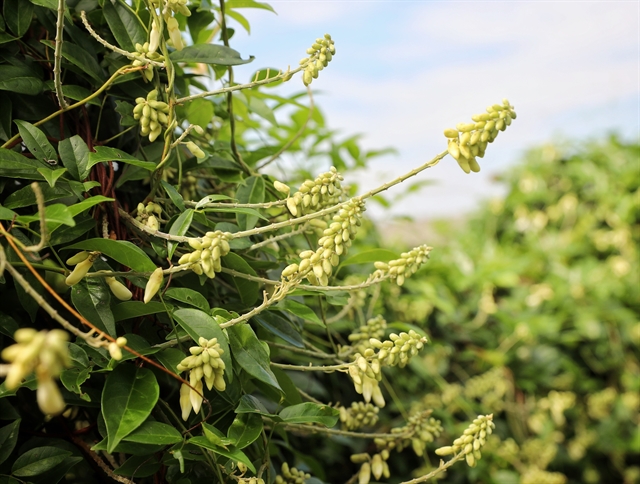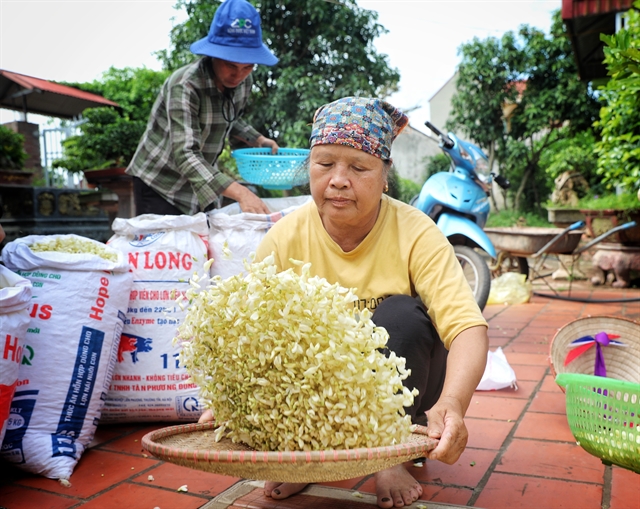The province aims to ensure that 50 per cent of rural tourism service businesses meet standards for serving tourists.

The Sâm Nam flower of Dành mountain in Bắc Giang Province has long been considered a powerful medicinal herb, once used as a tribute to the king. VNA/VNS Photo
BẮC GIANG — Mai Sơn, Acting Chairman of the People's Committee of Bắc Giang Province has affirmed that from now until 2025, the province will focus on developing rural tourism to promote the potential and advantages of agriculture, traditional crafts, culture, and natural landscapes.
Bắc Giang, which is north of Hà Nội, is focusing on standardising rural tourism destinations and products, aiming for at least three community-based tourism villages to be recognised by 2025.
Each rural district with tourism potential will develop at least one distinctive rural agricultural tourism linkage model, based on the local advantages in agriculture, culture, traditional crafts or ecological environment.
The province aims to ensure that 50 per cent of rural tourism service businesses meet standards for serving tourists.
They will be promoting rural tourism development in connection with digital transformation, with at least 50 per cent of rural tourism destinations being digitalised and connected through digital technology platforms for tourism promotion by 2025. All rural tourism destinations in the province are being encouraged to use electronic transactions.
In addition, all rural tourism businesses will be trained in management and 80 per cent of workers will improve their skills, with each destination having at least one English-speaking member of staff.
Bắc Giang is also developing rural tourism points and community-based tourism in line with rural development criteria.
The province implements promotional strategies and supports the development of rural tourism products based on the advantages of agricultural production and local culture, while positioning the brand for rural tourism destinations.
The locality will create models for rural tourism development, such as ecological community-based tourism, rural agriculture and preservation of nature and traditional crafts.
They will prioritise tourism models that offer unique regional products, deliver economic effectiveness and promote community awareness and responsibility in preserving cultural values and protecting the environment.

Farmers carefully select high-quality Sâm Nam flowers to process. VNA/VNS Photo
Deputy Director of the Department of Culture, Sports, and Tourism of Bắc Giang, Nguyễn Sĩ Cầm, said that the province has identified tourism development as a key, sustainable strategy for transforming its growth structure and boosting socio-economic development.
The province mobilises state and social resources to invest in the development of tourism while focusing on the development of community-based tourism and agricultural tourism linked to historical sites, culture, ecology and spiritual tourism.
Currently, Bắc Giang has 33 community-based and rural tourism destinations, with 250 households participating in tourism activities.
Some of the most successful destinations include Bản Ven, Bản Xoan, Bản Thượng Đồng in Xuân Lương Commune, Yên Thế District; Bản Nà Ó in An Lạc Commune, Sơn Động District; Bản Bắc Hoa in Tân Sơn Commune, Lục Ngạn District and Thổ Hà Village in Vân Hà Commune, Việt Yên Town.
Each year, these four destinations welcome about 70,000 visitors for sightseeing and cultural experiences.
The province has 12 community-based tourism villages in Lục Ngạn, Sơn Động, Lục Nam, Yên Thế District, which cooperatives and household investments have developed.
Twenty community-based tourism destinations linked to fruit-growing areas in Lục Ngạn District are being established, attracting about 350,000 visitors annually.
In 2023, Bắc Giang allocated funds from the national target program to support rural tourism development. The funding was used to buy electric vehicles, organise training and experience exchanges to improve tourism quality and for promoting tourism through brochures and films.
Additionally, the program focused on sharing experiences about community-based and rural tourism, both within and outside the province. VNS